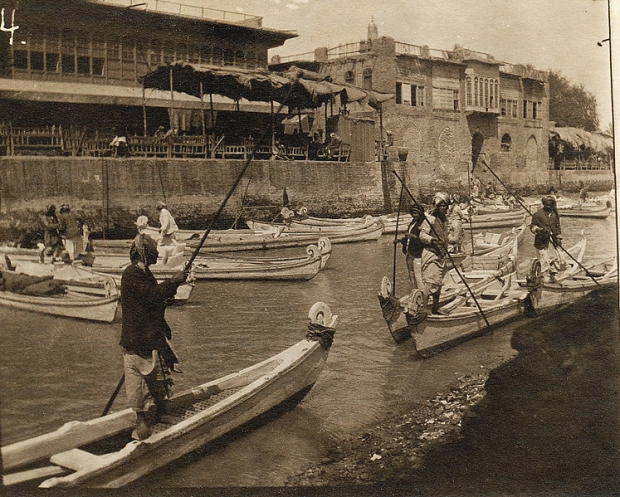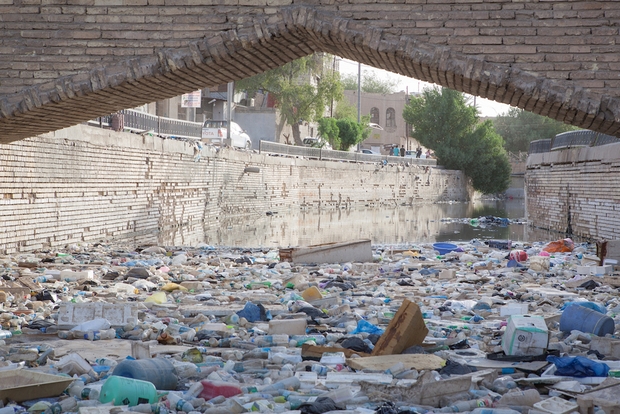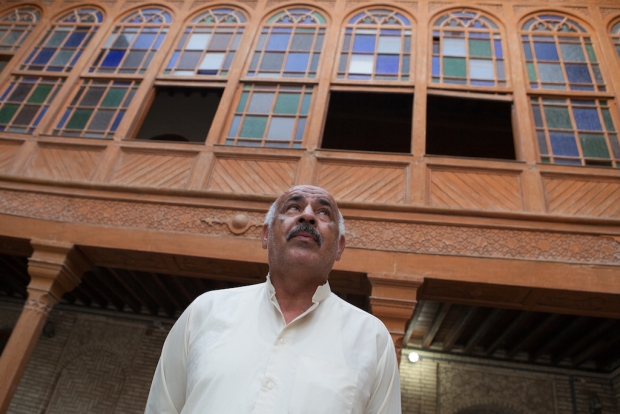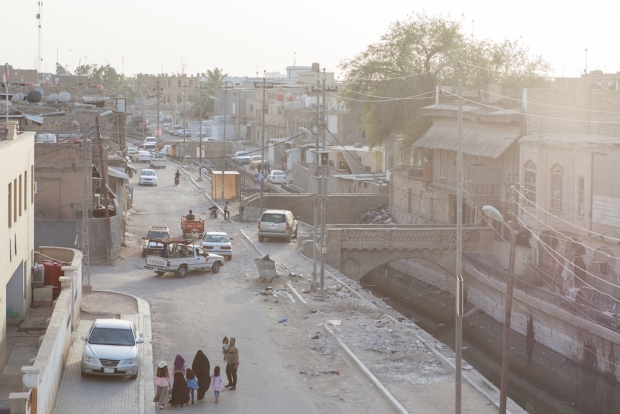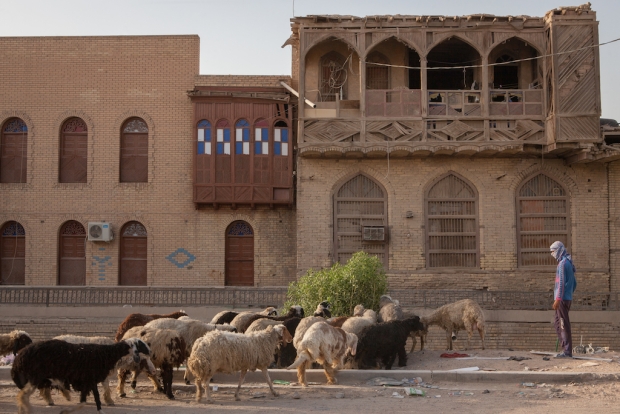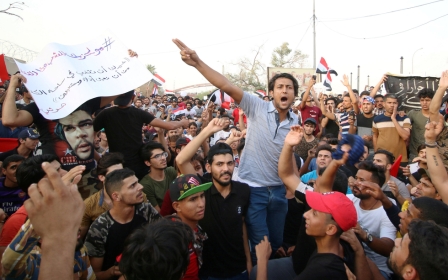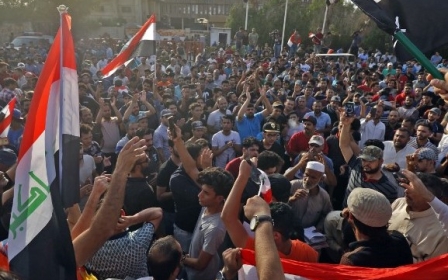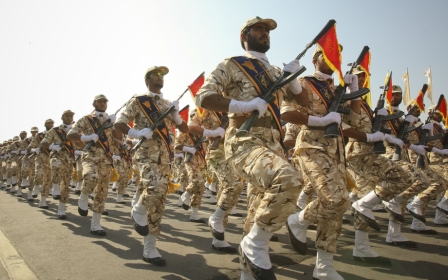Dead dogs and diapers: How Basra's fabled canals were left to rot and ruin
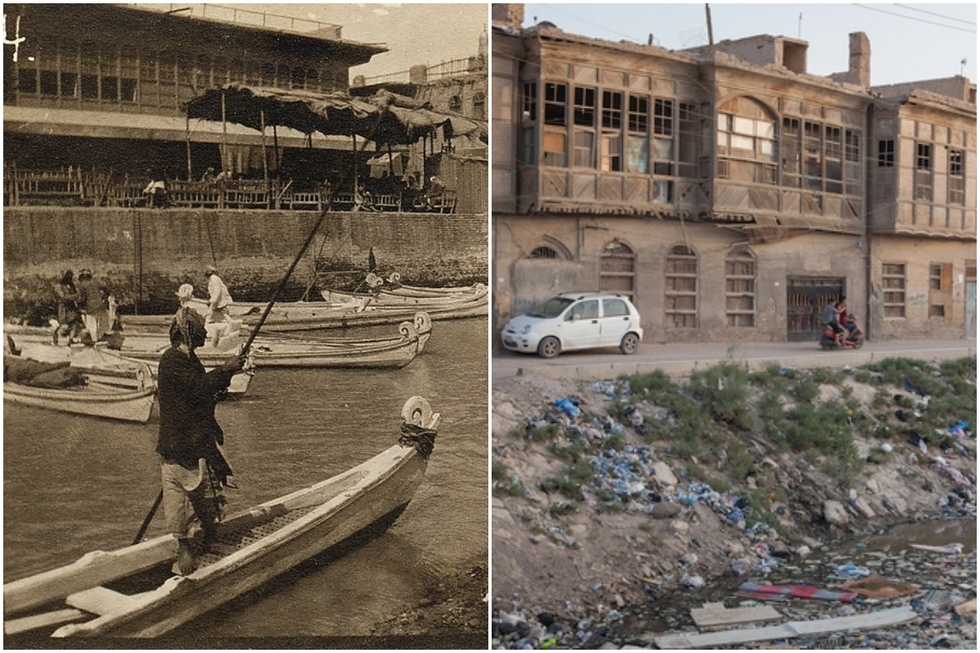
A dry wind blows black smoke out of a garbage can. A couple crosses a bridge over a crumbling canal. Piles of rubbish lie in their way. It is summer.
"Take pictures. Show the world what Basra has become," swears one old man, holding his nose.
Tourists used to come here. They called it the "Venice of the East", its ancient network of canals evoking the famous Italian city. Today, Basra is a shadow of its former self.
Constructed between the 16th and 19th centuries, when Iraq was ruled by the Ottoman Empire, the city's canals became a regional tourist attraction in the 20th century.
New MEE newsletter: Jerusalem Dispatch
Sign up to get the latest insights and analysis on Israel-Palestine, alongside Turkey Unpacked and other MEE newsletters
Those days are long gone. Rubbish, plastic bottles, used diapers and animal carcasses can be seen floating in the foul-smelling water.
“Before, I used to drink from the canal,” exclaimed Ali Kadoom, an 85-year-old man.
It was a place of celebration. There were lots of parties on boats, with folk and Western musics. People were dancing and alcohol was for sale
- Khalil Saleh, Basra inhabitant
While oil exports from Basra account for 95 percent of state revenues for OPEC producer Iraq, “the city is the worst of all Iraq regarding its urban condition,” Caecilia Pieri, former head of the Urban Observatory at the French Institute of the Near-East (IFPO), told MEE.
As temperatures rose to a sweltering 50 degrees Celsius, protests erupted in Basra on 8 July, before spreading north all the way to the capital, Baghdad.
Protesters denounced a lack of public services, including rubbish collection, water and energy shortages, unemployment and corruption. At least 16 people have been killed and hundreds wounded and arrested.
On Sunday, the Basra provincial council announced it would be petitioning the government in Baghdad to turn Basra into an autonomous zone along the lines of the Kurdistan Regional Government (KRG) in the north.
To calm the unrest, Prime Minister Haider al-Abadi has promised a "solutions package", including the creation of 10,000 government jobs and $3bn worth of investment into Basra.
However, “it is a problem that precedes the 2003 US-led invasion," according to Ibrahim al-Marashi, an associate professor of Iraqi history at the California State University San Marcos.
"Basra never really recovered from the Iran-Iraq War and a decade of UN-imposed sanctions,” he told MEE.
'A place of celebration'
At the beginning of the 20th century, the banks of Basra's canals - Iraq's gateway to the Gulf - were a lively place where Jews, Christians and Muslims lived in harmony.
Basra was famous for the originality of its chanachil - finely worked windows designed to bring more light into the house and offer a view to the street without being seen.
According to Pieri, the oldest houses still standing in Basra date back to the middle of the 19th century, a time when large-scale shipments of dates were transported on the canals to the Shatt al-Arab, a river formed by the confluence of the Euphrates and the Tigris, towards Gulf countries.
During the 1960s and 70s, Iraq's only port city became a place of abundance, benefiting from increases in oil revenues. Attracted by the quality of life, Gulf tourists would come to Basra for weekend trips.
"It was a place of celebration. There were lots of parties on boats, with folk [music] and Western music. People were dancing and alcohol was for sale," Khalil Saleh, a 68-year-old inhabitant, said.
But Saddam Hussein's accession to power in 1979 broke the momentum. Repression of dissent stripped away Basra’s cultural diversity, while wars with Iran and Kuwait damaged the city's historical heritage.
In the 1990s, Saddam Hussein's catastrophic decision to drain the Mesopotamian Marshes in order to punish and quell local resistance, prompted a mass influx of people in Basra, leading to tensions between Basra's existing urban population and their new rural neighbours.
“These people don't care about the history of the place. That is why they throw everything away,” said Kadoom, the 85-year-old, accusing the relative newcomers of causing the pollution.
Since the 2003 US-led invasion, not a single canal has been restored in the old city of Basra. Qahtan al-Abeed, director of the Basra section of Iraq’s State Board of Antiquities and Heritage, said there is no funding from the government to maintain and restore the canals.
Historic buildings in danger
On the banks of the canal, flies swarm around the bodies of two dead dogs. In this putrid morass, a young man masked by a scarf herds a flock of sheep.
A few metres away, another man wearing a grey dishdasha pours the contents of a large garbage can into the canal without hesitation.
Many houses in the city are illegally occupied by squatters.
"What can the Ministry of Culture do when their budget is zero,” says Abeed, who watches the situation in silence.
Squatters are opposed to any restoration initiative, he says.
"What can I do? Kick them out them and then it will be empty. More squatters will come! No, we need to get them out, and make it a cultural centre or something. But for now we still haven't planned anything,” says Abeed.
Along the canals, 150 historic buildings judged in good condition have been listed, and 400 others judged in intermediate or critical condition. “A lot of historic buildings are being lost, day after day,” Abeed says.
In 2007, Abeed’s colleague was killed while trying to retake control of the property of a former Greek consulate. "The squatters shot at us because we wanted to dislodge them," says Abeed.
The building, made of fine red bricks, wood and coloured windows, is now guarded by two policemen all year round and by Abeed’s office.
But for the moment, the ancient network of canals is crumbling, living conditions deteriorate and a nauseating smell attracts rats and cockroaches.
“We can no longer live like this,” said Abdul Hamid Talal, a 49-year-old shopkeeper working along the canal. Like him, thousands of inhabitants no longer believe in promises and are demanding immediate change.
Middle East Eye delivers independent and unrivalled coverage and analysis of the Middle East, North Africa and beyond. To learn more about republishing this content and the associated fees, please fill out this form. More about MEE can be found here.


